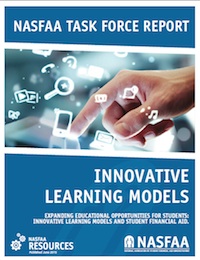Improving Financial Aid to Meet the Needs of Innovative Learning Models
 In response to rising costs and the large growth in the number of nontraditional students, policymakers and educators have started to examine innovative learning models as a possible solution for higher education. Competency-based education, prior learning assessments, and massive open online coursework (MOOCs) are among the types of initiatives garnering attention in the hopes that these approaches can expand access, speed time to degree completion, and reduce reliance on student loan borrowing.
In response to rising costs and the large growth in the number of nontraditional students, policymakers and educators have started to examine innovative learning models as a possible solution for higher education. Competency-based education, prior learning assessments, and massive open online coursework (MOOCs) are among the types of initiatives garnering attention in the hopes that these approaches can expand access, speed time to degree completion, and reduce reliance on student loan borrowing.
However, much of the federal financial aid system was designed years before many of these learning models were developed. Attempting to cultivate and implement innovative learning models within the confines of the existing federal student aid system has led to regulatory challenges, not to mention concerns over opportunities for fraud and abuse. The pending reauthorization of the Higher Education Act of 1965 (HEA), as amended, provides an opportunity to speak to these issues and take proactive steps to thoughtfully implement meaningful reforms.
To help address these challenges, the National Association of Student Financial Aid Administrators (NASFAA) convened a task force in November 2014. The task force was charged with the following:
- Meet with experts and pioneers in innovative learning models to better understand current and future trends;
- Consider the implications and challenges of administering Title IV aid to these new types of programs under existing statutes and regulations;
- Formulate recommendations for how Title IV regulations might be changed to accommodate these types of programs while protecting the federal investment and providing for program integrity; and
- Identify potential future development or demonstration projects that would experiment with innovative learning models.
Expanding Educational Opportunities for Students: Innovative Learning Models and Student Financial Aid
In June 2015, the Innovative Learning Models Task Force submitted its report to the NASFAA Board of Directors. The report identifies five major themes which set the platform for the statutory and regulatory recommendations presented by the task force:
- Flexibility for Students and Institutions
- Accountability
- Cost of Education and Federal Financial Aid
- Complexity
- Barriers
The rules, systems and processes that work for traditional, term based, brick and mortar programs do not always work to advance the innovation that currently exists within higher education, and the recommendations in this paper are the first step to help ensure barriers are eliminated that stifle this innovation.



